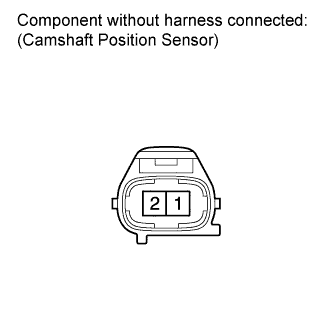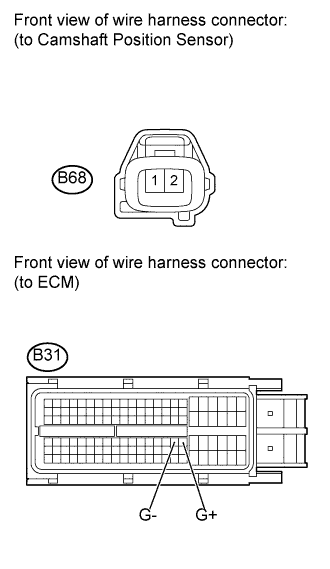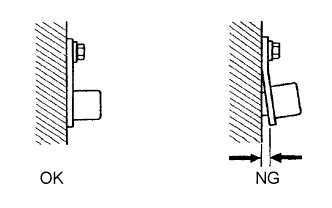Dtc P0340 Camshaft Position Sensor A Circuit (Bank 1 Or Single Sensor). Corolla Auris
Двигатель. COROLLA, AURIS. ZZE150 ZRE151,152 NDE150
DESCRIPTION
WIRING DIAGRAM
INSPECTION PROCEDURE
INSPECT CAMSHAFT POSITION SENSOR
CHECK HARNESS AND CONNECTOR (CAMSHAFT POSITION SENSOR - ECM)
CHECK CAMSHAFT POSITION SENSOR (SENSOR INSTALLATION)
CHECK CAMSHAFT TIMING SPROCKET
DTC P0340 Camshaft Position Sensor "A" Circuit (Bank 1 or Single Sensor) |
DESCRIPTION
The camshaft position sensor (G signal) consists of a magnet, iron core and pickup coil.The G signal plate (timing sprocket) has one tooth on its outer circumference and is installed on the camshaft timing chain gear. When the timing gear rotates, the air gap between the protrusion on the signal plate and the pickup coil changes, causing fluctuations in the magnetic field that generate a voltage in the pickup coil.The NE signal plate has 34 teeth and is mounted on the crank angle sensor plate. The NE signal sensor generates 34 signals for every engine revolution. The ECM detects the standard crankshaft angle based on the G signal and the actual crankshaft angle and the engine speed by the NE signal.DTC No.
| DTC Detection Condition
| Trouble Area
|
P0340
| When either condition below is met:
- No camshaft position sensor signal to ECM while cranking
(2-trip detection logic)
- No camshaft position sensor signal to ECM at engine speed of 650 rpm or more
(1-trip detection logic)
| - Open or short in camshaft position sensor circuit
- Camshaft position sensor
- Timing sprocket
- ECM
|
WIRING DIAGRAM
Refer to DTC P0335 (See page Нажмите здесь).
INSPECTION PROCEDURE
- ПРИМЕЧАНИЕ:
- After replacing the ECM, the new ECM needs registration (See page Нажмите здесь) and initialization (See page Нажмите здесь).
- УКАЗАНИЕ:
- Read freeze frame data using the intelligent tester. The ECM records vehicle and driving condition information as freeze frame data the moment a DTC is stored. When troubleshooting, freeze frame data can help determine if the vehicle was moving or stationary, if the engine was warmed up or not, and other data from the time the malfunction occurred.
| 1.INSPECT CAMSHAFT POSITION SENSOR |
Disconnect the camshaft position sensor connector.
Measure the resistance according to the value(s) in the table below.
- Standard resistance:
Tester Connection
| Condition
| Specified Condition
|
1 - 2
| Cold
| 835 to 1400 Ω
|
1 - 2
| Hot
| 1060 to 1645 Ω
|
Reconnect the camshaft position sensor connector.
| 2.CHECK HARNESS AND CONNECTOR (CAMSHAFT POSITION SENSOR - ECM) |
Disconnect the camshaft position sensor connector.
Disconnect the ECM connector.
Measure the resistance according to the value(s) in the table below.
- Standard resistance (Check for open):
Tester Connection
| Condition
| Specified Condition
|
B68-1 - B31-80 (G+)
| Always
| Below 1 Ω
|
B68-2 - B31-79 (G-)
| Always
| Below 1 Ω
|
- Standard resistance (Check for short):
Tester Connection
| Condition
| Specified Condition
|
B68-1 or B31-80 (G+) - Body ground
| Always
| 10 kΩ or higher
|
B68-2 or B31-79 (G-) - Body ground
| Always
| 10 kΩ or higher
|
Reconnect the camshaft position sensor connector.
Reconnect the ECM connector.
| | REPAIR OR REPLACE HARNESS OR CONNECTOR (CAMSHAFT POSITION SENSOR - ECM) |
|
|
| 3.CHECK CAMSHAFT POSITION SENSOR (SENSOR INSTALLATION) |
Check the sensor installation.
- OK:
- The sensor is installed correctly.
| 4.CHECK CAMSHAFT TIMING SPROCKET |
Check the condition of the timing sprocket.
- OK:
- The timing sprocket does not have any cracks or deformation.
| | REPLACE CAMSHAFT TIMING SPROCKET |
|
|


